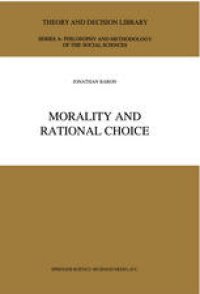
Ebook: Morality and Rational Choice
Author: Jonathan Baron (auth.)
- Tags: Philosophy, Ethics
- Series: Theory and Decision Library 18
- Year: 1993
- Publisher: Springer Netherlands
- Edition: 1
- Language: English
- pdf
Public controversies - such as those about the distribution of goods between rich and poor, trade and population policies, allocation of medical resources, and the tradeoff between environment al protection and economic efficiency - often hinge on fundamental views about how we ought to make decisions tImt affect each other, that is, what principles we ought to follow. Efforts to find an acceptable public philosophy, a set of such principles on which people might agree, have foundered because of dis agreement among philosophers and others who are concerned with such issues. One view, which I shall develop and defend here, holds that decisions that affect others should be made according to an overall evaluation of the consequences of each option. This consequentialist view is opposed by a variety of alternatives, but many of the alternatives have in COlllmon a basis in moral intuition. To take a simple example, consequentialism holds that, other things equal, if we have decided that it is better to let a terminally ill patient die than to prolong her agony by keeping her alive, then we ought to kill her.
This book develops and defends a version of utilitarianism, including expected-utility theory, as a normative model of decision making. The defense, based on the idea of utility as achievement of goals, considers the endorsement of a norm as a decision and asks what reasons we have to endorse norms for decision making. The reasons derive from our pre-existing goals, so any norm we endorse must not fly in the face of these goals, although it must not be selfishly biased, either. This approach is further clarified by drawing distinctions between decisions for the self, for a single other person, for several others, and for the self and others.
The book discusses the implications of this argument for the psychological study of decision making, the act--omission distinction, moral education, decision analysis, risk analysis, and other questions of public policy. The final chapter sketches a prescriptive approach to group decision making.